Editor's note: New Times is following the lives of nine Grizzly Youth Academy students, from the start of their journey down a new path toward academic and personal success, to the end. This story is the first installment in a series about the cadets.
The last of the fog is melting away from the hills that surround Camp San Luis Obispo on the morning of Aug. 1. The California National Guard lives here, as do the facilities to train and give logistical support to various civilian and military agencies at the federal, state, and local levels.
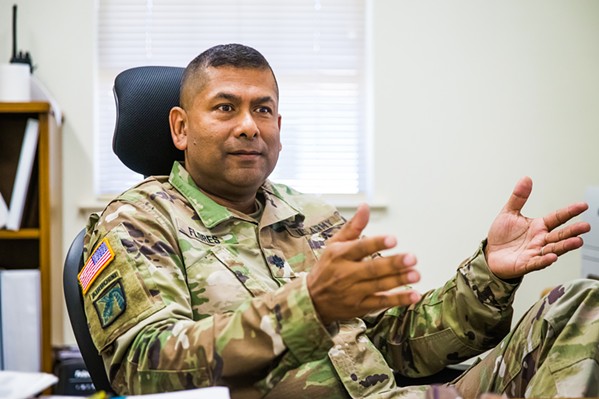
- Photo By Jayson Mellom
- FOR THE KIDS Francisco Flores, Grizzly Youth Academy's director, implements his philosophy: The Academy never quits and is there for every kid who walks through the door.
The Grizzly Youth Academy, a partnership between the California National Guard and the Grizzly Challenge Charter School, also lives here. It was the first of its kind in the state. Now, there are 39 similar programs like it across the nation.
Francisco Flores, Grizzly Academy's Lieutenant Colonel and director, is sitting at his desk with the windows wide open to let in as much natural light and breeze in as he can. He speaks passionately about Grizzly's class No. 43, which commenced on July 21. If you ask him what the Grizzly Youth Academy is all about, he simply says that it's a machine.
"We never stop. We're constantly in support of the kids, and we look at any and every aspect of how to reach the kids to help them change for the better," he says.
Grizzly is a youth program with a military-styled structure in which students make up lost school credits as well as learn the skills they need to be positive and successful individuals in society.
New Times sat down with nine members of class No. 43's 222 cadets to learn why they volunteered to join the program and what their hopes are for life after Grizzly.
The Machine
Grizzly is a program for youth between the ages of 16 and 18 who have dropped out of high school or are at risk of dropping out and need to catch up on credits.
The program is tailored to get students back on track academically, and it's also rooted in promoting leadership, cooperation, and academic skills—all while building self-esteem, pride, and confidence.
Flores says he and his staff do this by getting rid of all the "static" in their lives.
"It's my term, 'static.' It's like the static you hear on the radio. There's so much static and noise out there in society: social media, drugs, gangs, and truancy itself," he says. "It's that social noise of hearing, 'You're never going to achieve; you can't achieve.'"
He tells the kids who attend Grizzly that they'll always face that kind of input from their peers, adults, and society at large.
"You're going to have to learn to strengthen your guard, so when negativity comes your way, you know how to deflect it and you can then leave yourself open to the good stuff," Flores says.
The program tackles all those areas by focusing on a military structure, which means cadets wake up early to participate in exercise drills and team-building activities on top of attending classes.
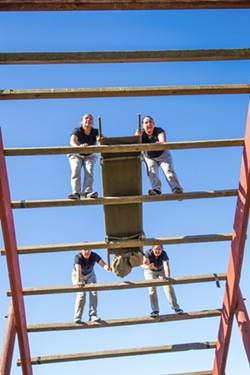
- Photo By Jayson Mellom
- TEAM EFFORT Grizzly Youth Academy's focus isn't just on bettering the individual cadets but about teaching them how to work together.
Grizzly is funded primarily through the federal government, the state of California, grants, and donations. Tuition, room, board, books, and food are covered for each cadet who joins the program. Parents only need to provide their kids with underwear, shoes, gray sweats, toiletries, a black hat, and other personal needs.
What makes the program unique aside from its military structure is that it's all voluntary—incoming cadets decide whether the 22-week residential program and 12-month post-residential phase (Grizzly checks on each individual after they complete the program) is the right choice for them.
Flores says almost all cadets join because they've realized they're ready for a change in their life. A few students do quit the program because they aren't ready, but that's an exception. He says almost all of them come back when they are ready.
The lieutenant colonel has been the director of the program for about a year, and when he arrived in the area, he was surprised to hear the community's misconceptions about who attends Grizzly. He heard people call the cadets "those troubled kids" or "those probation kids." Flores hates the phrase, "those kids."
"The reality of it is, it's not 'those kids,' it's our kids, our community kids, and our family kids. The beautiful thing about our kids is that they recognize that they need help, they have the opportunity, and have made themselves available to the opportunity," Flores says. "Every kid here has volunteered to be a part of this program and we do work hard and encourage them to stay right."
It's the second week of the Academy and classes haven't started yet, but the exercises, activities, and transition to the program's rigor has.
The kids all say pretty much the same things. Getting out of bed so early has been rough, some of the exercises or drills are tiring, and they miss their families. However, not one cadet complained about being at Grizzly. They all talk about their past as if it's already leaving them as they take steps into their future.
Luis and Nidia Valenzuela
Luis, 18, and Nidia, 16, Valenzuela are siblings who decided to join the program together. They had a mutual friend who went through the program and saw how much it worked out for him.
Luis says he was moved to attend Grizzly after a conversation with his mother.
From Huron in Fresno County, the Valenzuela siblings are the youngest of five. They describe Huron as a small farming community with not much to do, few job opportunities, and no high school. To attend Coalinga High School, they hop on a bus for a 25- to 30-minute ride.
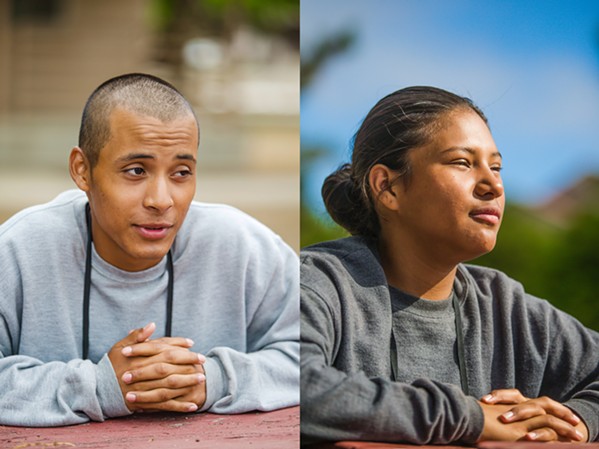
- Photo By Jayson Mellom
- SETTING AN EXAMPLE Luis and Nidia Valenzuela are siblings from Fresno County who supported each other in the decision to better their lives by joining Grizzly Youth Academy together.
Their mom (a single parent) provides for the family as a seasonal employee who works in the nearby fields picking produce, so come winter, she struggles with employment.
"But she does what she can, and she always provides for us. We never go to sleep hungry, we have a bed to lay in, and we never go without clothes on our backs," he says looking down at his hands.
Luis says his mindset used to be that adults didn't know what they're talking about, so he didn't listen to them much. With that attitude it was hard for him to take direction at school. He would often second-guess his teachers, and he skipped classes. He would rather smoke weed and hang out with his friends.
"I think it was mostly distractions, like friends. I just made one bad decision, and after that the rest kind of seemed easier," he says.
He wanted to make a change after having a conversation with his mom and realizing how behind he'd become in school. She made him realize how his actions now could have negative ramifications later on in life.
"She said, 'One day I'm not going to be here and I'm not going to be here to show you right from wrong. Make this time that you have with me, while you have it, valuable,'" he says.
His younger sister Nidia was going down the same path of smoking weed and not caring about school. She was on the track team, and her choices were affecting her athletic involvement at school. Nidia says that she had a friend who was also on the track team but later dropped out. That friend would convince Nidia to leave practice to hangout and smoke.
"When I started smoking I couldn't breath as well as I used to, and because of that I couldn't run as far as I used to, or liked to. I just gave up on it," she says.
Nidia heard that her brother was joining Grizzly and decided it was the right time for her to sign up as well. Her main goals are to get back into physical shape to be able to join the school track team again as well as get over her social anxiety.
Talking to New Times, she says it's hard for her but she's trying.
"I want to learn what my limits are, everything that I can and can't do. Everything that I can do, I'm going to try really hard at because I want to improve on myself," Nidia says.
Stephanie Recio-Soltero
Eighteen-year-old Stephanie Recio-Soltero is a mom from Lompoc. Even though she's wearing gray sweats, she's bursting with color and energy as she talks. Recio-Soltero was born in Santa Barbara but spent a good chunk of her childhood living with her aunt in Utah and then Lompoc.
She says she was raised by her aunt when her single mother was going through a rough patch. What she remembers most is how different Utah is from Santa Barbara County, mostly because of the snow.
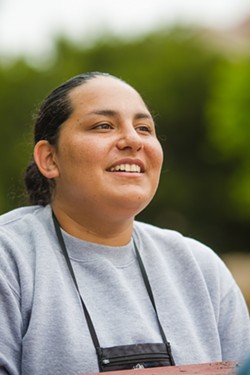
- Photo By Jayson Mellom
- NEW BEGINNINGS Stephanie Recio-Soltero is making a change in her life, academically, mentally, and physically, for her almost 10-month-old daughter.
"The snow is not fun, it's kind of a hassle sometimes because you can slip and fall, and you have to shovel out the driveway," Recio-Soltero says between laughs.
The transition to Grizzly life has been tough for her because of the strict programming, but she doesn't mind it. If anything, she says it's making her a stronger person. The most difficult piece for her is being away from her soon-to-be 10-month-old daughter.
"The first couple of days I cried because I think the hardest thing was leaving my baby. But being away from home, well, it's not that hard because I've been in and out of houses so I'm pretty comfortable anywhere I go," she says.
At Grizzly, Recio-Soltero says, she's guaranteed to have a bed, three meals a day, and two snacks—so she's not complaining.
Recio-Soltero was the type of student who got good grades and really enjoyed school. She was even on the honor roll. But when her brother went to jail for attempted murder, it changed things. Her brother was Recio-Soltero's guide. He gave her advice, told her right from wrong, and pushed her to excel in school. When he went away, she lost that guidance, and her mom lost their home, so she went to live with a friend who did drugs.
At the time, she was also encountering an issue with one of her 10th grade teachers, who Recio-Soltero felt was discriminating against her because of her race. She says the teacher would make her do assignments more than once, singling her out of all the students in her class. It felt like the odds were against her.
When Recio-Soltero found out about her pregnancy, she stopped doing drugs because she wanted to better herself and keep her baby out of harm's way. But once Yulema Rose was born, Recio-Soltero said she experienced "baby blues"—a form of postpartum depression—and she started smoking weed and doing meth.
"I think every mom gets baby blues no matter how long you've been a mom. You're always going to question if you're doing the right thing, if you're parenting right, or is this right or wrong?" she says.
Recio-Soltero cares too much about the future of her daughter to keep dipping back into substance abuse, so she learned about Grizzly and believes this is how she'll learn to stay off drugs for good.
"I feel very positive about this," she says with a smile.
Alexandria Regalado
When Alexandria Regalado, 16, sat down with New Times, she started tearing up at the thought of being away from her seven siblings who are waiting for her in Pinedale, an unincorporated community in Fresno County.
As she wipes away her tears, she says it can be hard at times to live in a home with so many siblings—she's the oldest—but overall it's fun to have a big family.
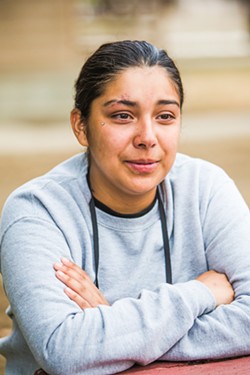
- Photo By Jayson Mellom
- STRENGTH TEST Alexandria Regalado sheds a few tears when she thinks about the seven siblings she's separated from for the first time to attend Grizzly Youth Academy.
The family, including her mom, lives with their grandmother, a now retired former registered nurse. Her dad has been in prison for about eight years, but they've always kept in touch through phone calls.
Regalado says her grandmother cried as she was preparing to leave, but her siblings didn't believe she would actually go through with attending Grizzly.
"Now [her siblings are] writing me and saying how proud everyone is of me," she says. "It feels like I'm finally accomplishing something or that I'm finally doing something for myself."
Regalado says that before coming to Grizzly she was just hanging around with her friends, not really doing anything. She liked to drink a lot, to the point that she would get frustrated if she didn't have alcohol in her system.
"I would get so drunk that I'd black out, and I didn't even know what would ever happen. I didn't even care, I was so drunk I didn't care about anything," she says. "I don't know, I just think I let myself go."
But Regalado is ready for change and says she wants to be a better role model for her siblings.
In her view, being a better role model is kicking her drinking habit and finishing the tasks that she starts. Regalado says that in the past, she never gave herself the chance to finish something. It's a characteristic she's ready to tackle through the program.
"I hope to learn how to always finish something that I started, how to be independent, and just to always keep pushing forward no matter how hard things get," she says.
Dezarey Cerna
Dezarey Cerna, 16, says she decided to come to Grizzly Youth Academy for her grandmother. Cerna says she's been causing her grandmother worry and stress with her behavior.
"I would go to my [high school] classes but I just wouldn't pay attention and I'd mostly sit in the back talking," Cerna says.
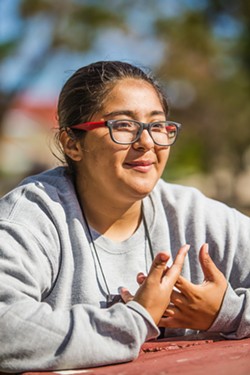
- Photo By Jayson Mellom
- SELF-AWARENESS Dezarey Cerna came to Grizzly Youth Academy because she wants to relieve her grandmother of the stress Cerna says she was causing her by falling behind in school and using drugs.
She also had a habit of smoking weed. It was a way for her to deal with the issues she was having with her mom, who lives with Cerna and her grandmother. She says her mom has never really been there for her.
"I've gone through depression because of that. People say, 'She's your mom even though she doesn't take care of you, you still have to have respect for her.' But it's hard to have respect for her when she's there living with you, but you can never go to her to express yourself because she's doing her own thing," Cerna says.
Her dad lived in King City and Cerna would visit him often, until he recently moved to Oakland to live with his wife and children.
"I can have more respect for him than I do for my mom because he checks up on me and he asks if I need anything. It makes me feel good when he checks in," she says.
In addition to gaining the right skills and credits to get back on track with school, Cerna says she wants to prepare herself for life after Grizzly. She's hoping to finish her senior year of high school and apply to college. Her long-term goals are learning and training to become a phlebotomist nurse—the nurse who draws blood. It's a career that her aunt, who lives in Hemet, has and one she wants to emulate.
Evelyn Frausto
Evelyn Frausto, 16, has a no-nonsense and positive attitude when she tells New Times that she was able to talk to her parents before the other girls in her platoon did.
She called them after a hike resulted in a knee injury. Frausto says her platoon was running down a hill when she fell and split her knee open. But she didn't call her parents crying or in a panic; it was just protocol. If a Grizzly staff member has to take a cadet off campus for a medical emergency—she needed stitches—a parent or guardian must be called.
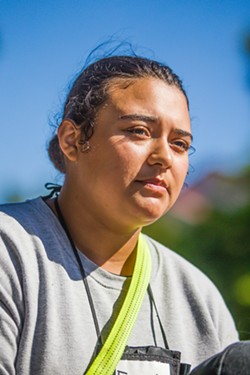
- Photo By Jayson Mellom
- NEW PATH Evelyn Frausto once juggled two part-time jobs and school to pay for her car; however, when she's done with Grizzly Youth Academy, she wants to focus on her family.
"So I told her I was fine, and then [my mom] asked about how the program was going. At first I was telling her it was really hard because you get homesick and the first day here all you hear is the other girls crying," Frausto says.
She knew the beginning of the program would be difficult, so on the day she was dropped off, she told her parents they each get a five-second hug and then she walked into her classroom without looking back.
"We're almost done with the first two weeks, and that's the hardest part. At the end of the day you feel accomplished, you're glad you're here, and that's what keeps you motivated," she says.
Frausto was attending her high school classes and working two jobs: as a store clerk at Adidas and a supervisor at Gilroy Gardens (a family theme park). She worked both jobs to pay for her car insurance because she had a deal with her parents—if she could pay for the insurance, they would pay for the car.
With her jobs came new friends. One thing led to another and they would all smoke weed together. She started to fall behind in school and use the money she earned for buying weed. Her friend group would always say they were going to quit smoking, but never did.
Her parents were constantly on her case about her grades and reprimanding Frausto for her behavior, but her nieces are what made her realize she needed to stop.
"My sister would bring her baby over a lot, and I would babysit my little cousin every so often, but it took a toll on me. I didn't want them to grow up and think I was a drug addict. I don't want them to see me all slumped and out of it, so I decided I should come here, get sober, and stop," she says.
She knew this program would help her because her brother and sister had attended the Grizzly Youth Academy. Her brother works for a union and has a family of his own. Her sister joined the military and has a family as well.
Frausto wants to go back to high school and apply to San Jose State University to become a criminal psychologist.
Her other long-term goals include spending more time with her family. They're her biggest motivation to change.
Cooper Brown
Sixteen-year-old Cooper Brown grew up in two households starting when he was about 8. Weekdays were spent at his mom's home in Paso Robles and weekends were spent with his dad in Hanford, in the San Joaquin Valley.
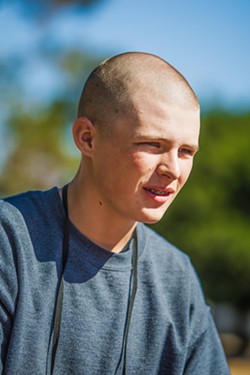
- Photo By Jayson Mellom
- GOALS Cooper Brown said his long-term career goal is becoming a mechanic for race cars to fulfill is love of cars and going fast.
Brown is reserved as he explains that he hasn't given the back-and-forth between his parents much thought. It's just something he's done since he was a child.
With both his parents working full-time jobs, Brown says he was home alone most of the time and basically could do whatever he wanted.
When it came to school, he continued with that mindset and slept in class, didn't care much for the curriculum, and hung out with his friends.
"I never really cared and everything for me is, whatever," Brown says. "That's why I'm here to change that."
Brown's future career goal is to become a mechanic for race cars. He loves anything on four wheels with a fast motor. He wants to be able to care enough to learn the trade and have a career.
"If you're not successful in life, you're struggling, and I want to be able to pay bills and stuff," he says.
Noah Landeros
Noah Landeros just turned 18 on Aug. 12, and he already has a game plan for his life after Grizzly. He really wants to attend Grand Canyon University in Phoenix, Arizona. In order to get there, he plans to go back to his hometown of Bakersfield after completing the program, go to community college, and then enlist in the military with the hopes of getting into the university.
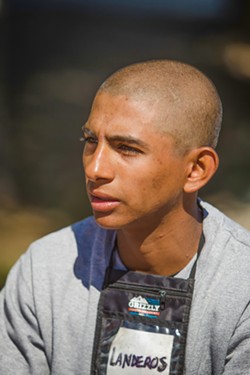
- Photo By Jayson Mellom
- CHECK LIST Noah Landeros plans to leave his past behind and focus on receiving higher education and setting the standard for his family.
Landeros didn't really have a plan for himself before Grizzly, he was just worried about following the orders of his foster parents.
He entered the foster system with his siblings when he was a baby, so his grandmother took them in through a relative care program. When Landeros was 2 years old, his grandmother died of cancer. For the next seven years, Landeros and his siblings lived with his great-grandmother and two aunts.
"I just remember mostly bad experiences. My sisters were forced to do drugs, they would hit me. I was abused for along time there. I was locked up in my room and wasn't allowed to go out for weeks at a time," he says.
His two older sisters asked teachers for help, and when a social worker came to the home to answer the call, Landeros and his siblings were taken the same day to return to their biological mother.
For a brief couple of months, the Landeros siblings were living with their mom, but being a single mother was challenging, and he says that she started physically abusing them.
He says they were split up and put into foster care homes. While he moved fewer times than his siblings, he still hasn't found stability. He's striving to provide that stability for himself.
"Now is the opportunity for me especially because of my age and because of what I want to do not only for myself but to set the standard for my family," he says.
Ashton Tolliver
Ashton Tolliver, 17, tells New Times that he's an introvert who doesn't say much and usually keeps away from other people. However, as Tolliver explains his first job at Chuck E. Cheese's in Lancaster, his personality shines. After being employed for seven months, he says he worked all the positions in the restaurant and family center because he's a hard worker.
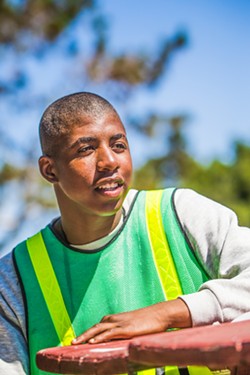
- Photo By Jayson Mellom
- GROWING UP Ashton Tolliver said he's not only working on fixing his academic record, he wants to prepare for his next steps, with adulthood on the horizon: career in construction, owning a home, and having a family.
His mood begins to shift as he talks about entering the foster system after his grandmother died in 2016. His grandmother became his adoptive guardian when his biological mother lost custody of him and his other siblings due to substance abuse.
His siblings were old enough to be considered adults, so he entered the system alone.
"It was just a lot of adjusting to different people, different places, and different ways of doing things," Tolliver says.
He stayed in three different foster homes, and the adjustment wasn't easy. As school became more difficult for him, his grades dropped, he started smoking weed, got in fights at school, and constantly ran away from his foster home.
Tolliver wants to change through the Grizzly program. He turns 18 soon, and he says he wants to make up the credits that he's missing in school so he can finish high school on a positive note. He has two job opportunities waiting for him after Grizzly—at Costco with one cousin and in construction with another.
More importantly, Tolliver says he wants to work on his relationship with his mother, but he anticipates that it will take time. He saw his mother the day he was leaving for the program.
"She wanted to have a better relationship with me and didn't want anything to happen while I'm out here. It's going to take a little bit more than just saying so," he says. "I'm trying to drop my grudges with everybody, you know, trying to get myself together." Δ
Staff Writer Karen Garcia can be reached at [email protected].
Correction: The story has been updated to reflect the changes made to the name Francisco Flores and his position title. The article incorrectly stated that his last name was Lopez and that his title was just lieutenant.
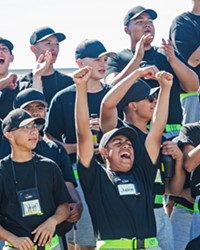
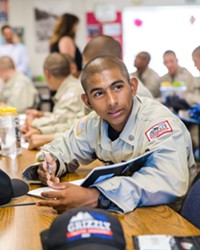
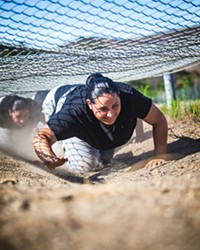
Comments
Showing 1-1 of 1